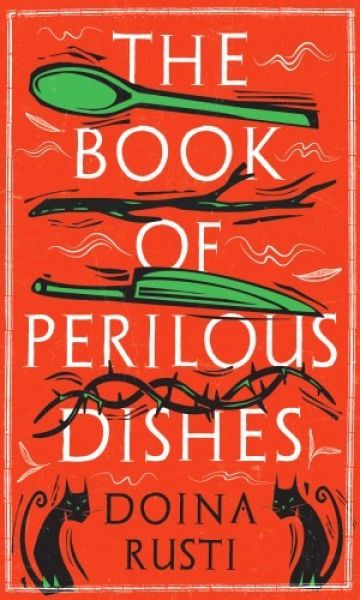Might Be Omens
The Book of Perilous Dishes
By Doina Ruşti (Translated by James Christian Brown)

5 Jun, 2024
0 comments
Doina Ruşti’s 2017 The Book of Perilous Dishes is a stand-alone historical fantasy. It was originally published as Mâţa Vinerii. The James Christian Brown English translation came out in 2022.
In 18th century Braşov, accusation is followed by swift punishment. Accused of witchcraft, Maxima Tutilina does not waste her time trying to save herself; after all, the accusation is true. Instead, she orders her fourteen-year-old granddaughter Pâtca to flee to her grand-uncle Zăval.
If only Pâtca had fled faster! By the time she arrives at Cuviosu Zăval’s home, her grand-uncle is dead, a knife buried in his throat. If she had been there, perhaps he might have lived. Like her mother, Pâtca belongs to the Satorite cult. She has occult knowledge and talents that might have saved the day.
The setting: eighteenth-century Wallachia. It is inconveniently located, close enough to the mighty Ottoman Empire that it cannot resist conquest, but distant enough from Istanbul that local unrest is nearly impossible to completely quash. It’s also too weak to defend itself against other ambitious neighbors, such as Russia. Result: endless chaos and violence. It’s an administrative headache.
The Turkish solution is to allow wealthy, ambitious Greeks to purchase the right to rule the region. None of these rulers last long. This is a plus from the Turkish perspective, as rapid turnover increases the rate at which rich Greeks bribe the Sublime Porte.
The current Prince of Wallachia is Kostas. Being no idiot, Kostas understands that he has only a few years to make back the bribe it took to become prince. Kostas’ devotion to maximizing income would be inspiring, were it not so burdensome to his subjects. All Wallachians can do is wait and hope that the next greedy Greek is less onerous.
Amongst Kostas’ acquisitions: Caterina Greceanu’s slave chef Silică. Caterina is the wealthiest woman in Bucharest. The prince has made a powerful enemy.
Annoying Bucharest’s rich and powerful is simply the cost of being prince. What Kostas does not know is that Silică is in possession of the Book of Perilous Dishes, a recipe book whose title is all too descriptive. Silică is neither magician nor sorcerer and has no idea how dangerous his recipes can be.
Pâtca does. However, even if Pâtca weren’t a fourteen-year-old girl in a land that does not overvalue teenaged girls, she has a prodigious talent for misadventure. Although her great-aunt squirreled away a fortune in case of calamity, Pâtca has great difficulty accessing it. Indeed, soon after finding her grand-uncle’s body, Pâtca is robbed of almost everything she has with her.
Barefoot, with no living relatives, Pâtca seems destined for prison, if not an early grave. Prophecy tells another story: Pâtca is the Cat o’ Friday, whose coming will bring disaster.
~oOo~
Fans of linear narratives should be aware Pâtca’s mind does not run along straightforward rails.
1798 Wallachia is far from modern… in everything. Superstition is rife, laws are erratically enforced, and certain ethnic minorities, Roma1 in particular, are deemed property. Thus, nobody questions why Silică is a slave. The only dispute is who should rightfully own him.
At the risk of undermining dramatic tension, I should note that Pâtca will not die despite kidnapping, imprisonments, and other misadventures. Pâtca is telling the story of her youth, in 1829.
Kostas is less fortunate. His reign is short even for a Prince of Wallachia. Pâtca provides the secret context for Kostas’ rapid fall. Thank the Book of Perilous Dishes and the meals no prudent person would prepare or eat. By absconding with Silică, Kostas sealed his own fate.
At least that’s what we’re given to believe. Pâtca is not a reliable narrator. Many of the events she relates are ones about which she heard only second-hand2. Moreover, it is entirely possible that rather than being the possessor of powerful occult secrets, Pâtca is instead tremendously credulous.
Nevertheless, the tale unfolds at an enthralling pace. Pâtca relates her secret history with considerable energy and conviction. Whether it all happened this way is beside the point.
The Book of Perilous Dishes is available here (Amazon US), here (Amazon Canada), here (Amazon UK), here (Apple Books), here (Barnes & Noble), here (Chapters-Indigo), and here (Words Worth Books).
1: Pâtca never uses the term Roma; she prefers the G‑word.
2: Kostas’ execution being a fine example. Pâtca claims the Sultan’s emissaries decapitated Kostas immediately after handing him his death warrant. Very dramatic! But it seems he was strangled, shot, stabbed, and only then decapitated. Presumably, the Sultan’s people wanted to make sure the prince was very sincerely dead.
